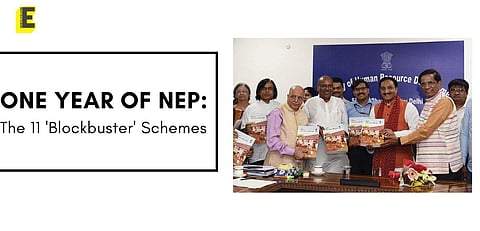

One year after the new National Education Policy was cleared in parliament, Prime Minister Narendra Modi announced eleven schemes to kick things off. This happened during an online congregation of big names from the Ministry of Education, including the Education Minister Dharmendra Pradhan, and the students and teachers from across the country.
With the focus firmly on digitisation of education, and what seemed like an absolute obsession with Artificial Intelligence-based learning, the schemes attempted to give substance to some proposals of the NEP.
Website for AI awareness: Perhaps the vaguest of them all, the proposed website for Artificial intelligence is said to incorporate a four-hour mini-course titled AI for All, launched by the Ministry of Education, the CBSE, and intel India, and is available in 11 languages. In his address, the Prime Minister brought up AI umpteen times, saying, “The AI programme will make our youth future-oriented, and create an AI-driven economy. The programme will also push the machine learning milestones, and revolutionise the industry.”
Academic Bank of Credit: The much-touted multiple entries and exit points for undergraduate courses in the NEP will be supported by the Academic Bank of Credit, regulations for which will be released by the UGC 'soon'. The PM said, “Students feel pressured to make career choices, and are scared of having made the wrong one. The NEP gives them the academic flexibility to change their course or college, and take their time to finish their studies.” Every student in the undergraduate setup will have an "account" where they can store their credits from various streams across the years. The accumulated credits in the digital "academic bank" will all count towards their degree.
AICTE's Artificial intelligence Indian languages translation tool: Modi had also talked about the importance of making education accessible in regional languages, and to support that, the AICTE-developed AI-based software was also launched to translate syllabi in 11 Indian languages.
Internationalisation of higher education: They've been talking about international rankings for a while now. “We used to think that for good education we would have to go abroad, but now, we students will come from different countries to India for a good education,” declared the Prime Minister, adding that he is pleased to inform that 150+ institutions in the country now had an office of international affairs. He said that guidelines were issued for research to be conducted on an international stage. The ministry also announced that credit transfer and “twinning facilities” will also be provided to the students, guidelines for which will be released by the UGC.
National Digital Education Architecture: In one of its more ambitious schemes, the centre announced an online repository of digital infrastructure for education, which will combine teaching-learning and planning and governance. The open-source platform, developed by the IT Ministry and the School Education Portal (eduportal.cg.nic.in) will be available to private entrepreneurs too, to create “innovative, future-ready education solutions.” “The youth has taken to online learning easily despite the tough COVID times, and it is to support this drive in them that the NEP pushes for a digital future,” said the PM adding, “Digital education will be made available to rural and urban, rich and poor students simultaneously.”
National Education Technology Forum: Along similar lines falls the NETF which is directed towards streamlining education management right from “KG to PG.” In other words, teaching planning, evaluation and administration in education will deploy technology such as artificial intelligence, machine learning and blockchain to “bring a revolutionary change in education administration.” The question of how, however, is still anyone’s guess.
Structural Assessment for Analysing Learning Levels: The NEP’s bid to leave an impact on the school system saw it proposing an alternative format of assessing students. Touted as a "competency-based programme that takes students away from rote learning,” SAFAL will not actually count towards the grading system for the students.
NISHTHA 2.0: The PM in his address laid plenty of emphasis on the importance of teachers or “gurus” in the system. A teacher training programme on the Diksha portal, the second phase of the programme targets secondary school teachers. “The Diksha portal sees five crore hits a day, and has garnered 23 crore hits ever since it was launched,” claimed Modi, urging teachers to lead the way in supporting the government’s schemes by participating in the NISHTHA activities.
Sign language as a subject: To empower children with disabilities, the NEP has officially made Indian Sign Language an official subject. “Promoting the ISL will assist three lakh children in need of disabled-friendly education,” said the PM.
Vidya Pravesh: With regards to the rather amorphous Vidya Pravesh scheme, the Prime Minister said, “Playschools which were only a thing in urban areas will now be a universal programme, implemented in villages too. Whether rich or poor, the kid will begin his education ‘hanste khelte’ (with fun and frolic).”
Launch of first-year engineering programmes in regional languages: Colleges in eight states across the country had announced on the eve of the NEP’s anniversary that they will be offering engineering courses in regional languages. “This will impact the rural and SC ST OBC populations and help them get over the language divide. They have suffered the most,” said the PM, adding that primary education will also incorporate regional languages.
